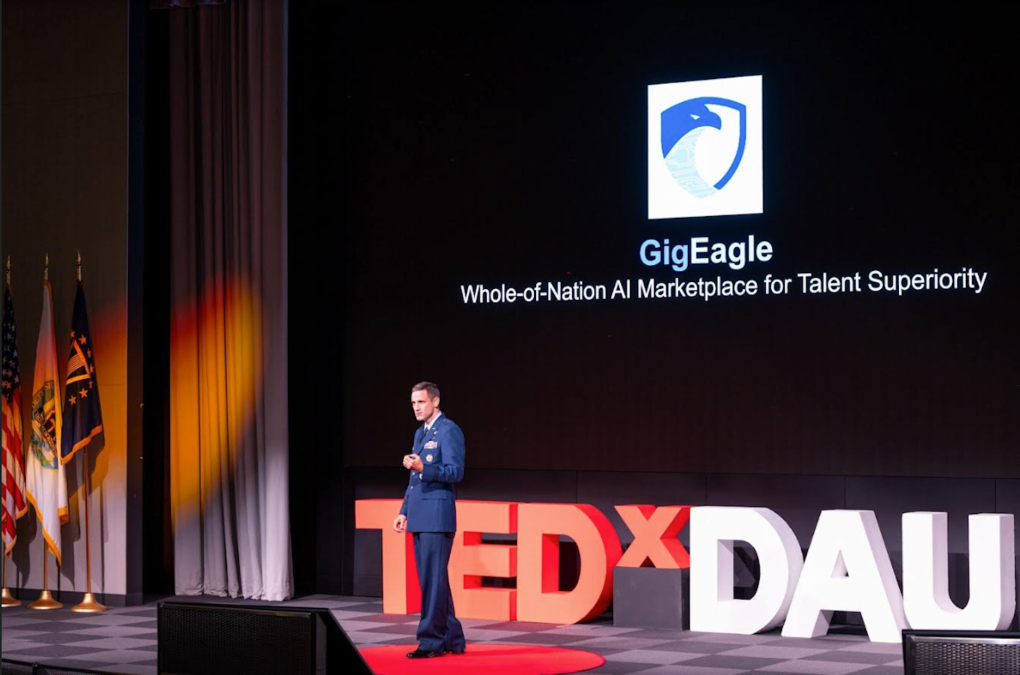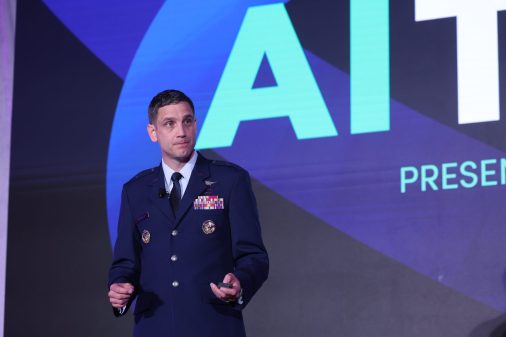DIU moves to scale AI-powered app that links defense talent with temp work

The Defense Innovation Unit launched GigEagle in 2022 as an artificial intelligence-powered prototype designed to match certain military personnel with unique and underutilized skills to temporary, short-term work opportunities applicable to their expertise and in demand across the Pentagon’s components.
Since then, that real-time talent marketplace has been expanding to serve an increasingly wider variety of Defense Department users and enabling heaps of new connections between people and options for 90-day-or-less gigs.
Now, according to two defense officials deeply involved in its making, GigEagle is moving from prototype to a “production-other transaction (OT)” contract vehicle that will open up the platform’s aperture and reach — potentially transforming it into other iterations, like one to empower military spouses.
“What we’re doing is something that is new. It’s bold. It’s never been done. It’s a completely new way to think about how to identify and engage people, optimizing talent for great power competition,” Air Force Brig. Gen. Mike McGinley, the creator and director of DOD’s GigEagle Agile Talent Ecosystem, told DefenseScoop.
‘Laying the foundation’
McGinley was working in his reservist capacity as an attorney in 2016 when then-DIU Director Raj Shah reached out and asked him to open up a new outpost for the innovation unit in Boston.
“How often do you get a phone call like that?” he noted.
Not long after that, McGinley became one of the earliest employees to enter that nascent DIU office in Boston’s iconic Kendall Square innovation district. Looking around the vast 11,000 square feet of open office space, he immediately wondered how he’d find the right mix of personnel to fill it up.
“Thankfully,” he said, “Chuck soon arrived.”
Lt. Col. Chuck Kubik has been working closely with McGinley since then. In his current role, he serves as GigEagle product lead.
“I’d found a random job on some Air Force Reserve’s website that was cryptic. And I was like, ‘What is this? DIU? I don’t know what this is,’” Kubik told DefenseScoop.
He asked around to different colleagues to figure it out and was eventually connected with McGinley, who met him for the first time at a Dunkin’ Donuts and hired him to join DIU’s team.
Soon, the officials said there was a “flood of other reservists” who wanted to work at the unit’s new Boston hub. Impressive, highly credentialed officials were applying to join, but it was taking about six months to hire new recruits at DIU at that time, and the team couldn’t keep everyone engaged and in talks for that long.
One day around this time, McGinley had “an epiphany” while in-transit using a rideshare app.
“I’m like, I’m sitting at DIU, whose purpose is to identify and engage existing commercial technology. Uber solved for this — why can’t we do the same?” he said.
McGinley asked Kubik to conduct an analysis to ensure the idea wasn’t already duplicated somewhere else in DOD, then had the team start pitching the concept to stakeholders and work to obtain funding.
Originally, in those “whiteboard” brainstorming days, they named the effort Project Dream Team.
“So think about if I could build a team — if I have a new operational problem I’m trying to solve, and I could, like no kidding on command, I could say, ‘What skillsets do I need?’ Maybe somebody with a specific foreign language experience like Farsi, maybe somebody who’s got drone expertise, maybe someone who has industry experience, maybe somebody who is really good at engaging with the local population, whatever that happens to be, if I could identify and pull those people around from the department — that’s what this is all about,” McGinley explained.
Over time and with a bit of refining, feedback and cross-team collaboration, Dream Team matured into GigEagle, which is a portmanteau of “gig” for short-term work, and “eagle” representing the department, McGinley said.
The app is envisioned and designed to be used by a wide variety of DOD officials and partners.
In its first iteration as the prototype, it was catered and available to members of the National Guard and reservists. Now, GigEagle is opening up to all active duty personnel. And down the line, the team aims to also have versions for approved individuals from academia and the private sector to connect and find relevant opportunities via the app.
“So imagine I could say, ‘I need skills from somebody who’s a professor at MIT with a radar background, or at CalTech, or somebody from industry to come in to provide me short-term work and support, because the operation has changed in a new, novel way.’ How do you identify that talent? We could never do that before, but through the concept of this whole-of-nation collaboration that’s empowered by this talent marketplace, we now can do that. So we’re laying the foundation to build to that ultimate end,” McGinley said.
GigEagle was largely built by the company Eightfold AI, on contract with DIU, and the software-as-a-service or SaaS-based platform is updated and new products are released iteratively.
“I mean, even in the couple years we’ve had the product up, it has transformed entirely since then. They’ve got new use cases, new features. And by going with a commercial platform that we’re configuring to our use case, we’re able to take advantage of the speed that AI is changing in the commercial space,” Kubik said.
To join the app, individuals must first create their own personal account profiles on the gigeagle.mil website.
McGinley and Kubik brought a tablet device to the interview and offered DefenseScoop a full demo of GigEagle in its latest version. As reservists work in four-hour blocks, it’s designed primarily for workloads between four hours and 90 days.
The open, temporary job posts and user profiles are searchable through keywords. Based on what it understands about each user’s expertise, the app also rapidly provides personalized recommendations for existing gigs.
“That’s how it’s using AI. So, here’s the details of the gig, but then it’ll also say, ‘Here’s why we think you’re a good match for that role.’ And then you can apply for it [in the app] … and you’re off to the races. Now you’re having a conversation with experts about if it’s a good fit, versus only relying on who you might know or your own personal connections,” Kubik said.
Time to scale
In an email Tuesday, DIU Director Doug Beck told DefenseScoop that the unit “is proud to have helped create GigEagle, and is committed to ensuring its success in delivering the very best talent to the Department’s critical needs, as well as a pathway for the best talent to serve the nation in the right place at the right time.”
And as their team moves into the next chapter of GigEagle’s maturation, Kubik and McGinley told DefenseScoop, a notable element of the talent marketplace that they’re tracking, is how it can enable more options to promote “jointness” in various operations across the U.S. military forces.
They pointed to a recent project the app helped source where members of the Army Reserve supported an active duty Air Force unit, and said they continue to see all roles and ranks pop up on the platform.
“There are policy guardrails. But at the end of the day, if we think about building a joint force, what better way than giving our people opportunities to engage in joint missions?” McGinley said.
GigEagle is also underpinning increasingly informative analytics about the military populations tapping into it. As a reservist, McGinley noted, he takes great interest in parsing through the analytics section and observing different trends across the skills of his colleagues who use the app.
“Then, we start looking at active duty and see, well, a lot of these people are doing some amazing things in their free time. You can have your security forces defender who’s taking Python coding courses, and you wouldn’t otherwise see that,” he said.
Now his team is looking into potentially creating “a digital ribbon rack” — or a computer-based version of the ribbon racks that military members wear on their uniforms to display their achievements — on GigEagle, to present users with certifications and endorsements recognizing their continued learning pursuits.
“People want to feel valued,” McGinley said.
Further, with this prototype fully developed, DIU is now maturing GigEagle into its next phase — a production other transaction (OT) contract agreement vehicle. This strategic move is standard for the unit and will ultimately allow organizations all over DOD’s enterprise to contract and engage on the platform.
“It’s all through Eightfold AI. That’s the product. So just like you would buy drones off of production OT to scale those, we’re scaling different use cases. And so we’ve designed this contract to be not just flexible, but the idea that it can be ready to go for the next four to five years,” Kubik told DefenseScoop.
The team is currently “in negotiations going through the contracting process now,” with intent to announce awards near the beginning of fiscal 2025, which started Oct. 1.
When asked for more details on the path ahead, a DIU spokesperson told DefenseScoop that a one-year production OT contract was awarded at the end of fiscal 2024.
“This is a bridge contract to take GigEagle into the new fiscal year and from prototype into production. We are working toward a multi-year option production OT contract that further enables scaling across the enterprise, however, organizations across DoD can engage with the platform now,” they confirmed in an email.
“We’ve imagined this production OT to be more like a menu of options so that this can actually scale across new use cases,” Kubik noted in the interview.
The Air Force and Marine Corps are currently launching active duty-focused GigEagle pilots to take advantage of the platform in ways DIU hasn’t yet.
DIU is also working with the personnel and readiness directorate in the Office of the Secretary of Defense on a version called GigEagle SOAR (an acronym for Spouse Opportunity Access and Recognition), which McGinley described as “the first-ever skills-based talent marketplace for military spouses.”
“Every time we talk to a new potential stakeholder, they bring in a new use case we haven’t even considered yet,” he added.
The team has put about $6.3 million into GigEagle to date, with support stemming from Congress and multiple military branches over the years, he said. DIU declined to confirm any amount for funding investments planned for the OT vehicle.
“As we scale agile talent across the Department — and particularly the leverage of ‘dual fluency’ reservists to help scale innovation, DIU looks forward to partnering with OSD (Personnel & Readiness) and the Chief Digital and Artificial Intelligence Office to drive enterprise implementation of this critical agile talent capability,” Beck told DefenseScoop in the email.






